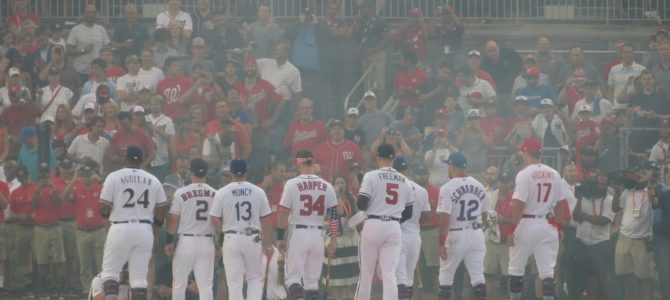
On Monday night, Washington Nationals outfielder Bryce Harper put the home in the Home Run Derby, winning the annual All-Star Game exhibition in his own ballpark with a thrilling come-from-behind performance in the competition’s final round against Chicago Cubs first baseman Kyle Schwarber.
Schwarber hit consistently well all evening, and blasted 18 home runs in his final round. Conversely, Harper started off slow in his last plate appearance. With only four minutes to match Schwarber’s total, he hit but four home runs in his first 1:42. Harper’s father, who again served as his pitcher for the Derby, didn’t help matters with a few errant pitches—enough that the hometown crowd, suddenly grown pensive, let out a smattering of boos.
But then, baseball’s youngest-ever Most Valuable Player went on an epic hitting tear. Harper crushed nine home runs in ten swings—I’ll say that again: nine home runs in ten swings—in his final minute, to tie Schwarber. Harper used the bonus time awarded for the length of his bombs to hit the one homer he needed to break the tie and capture the Derby crown, 19-18.
All the while, the hometown crowd witnessing the historic spectacle rose louder and louder, reaching a crescendo at the end of that magic minute. They had cheered Harper throughout, screaming “Let’s go, Bryce!” and gently heckling his opponents. The combination of the hometown crowd—only two other players have won the derby in their own ballpark—and Harper’s amazing comeback seem destined to go down in All-Star Week lore.
For the uninitiated, the Home Run Derby has its roots in a 1960 made-for-television show of the same name, in which players competed in nine-inning “games” to hit the most home runs. Major League Baseball revived the concept in 1985 (albeit in a slightly different form), and it proved a hit. The enthusiastic announcing of ESPN’s Chris “Back-Back-Back” Berman, and slugging feats like Ken Griffey Junior hitting the Camden Yards warehouse in the 1993 contest, helped make the Derby a highlight of All-Star Week.
With the All-Star Game in Washington on Tuesday, the nation’s capital witnessed a power spectacle of the literal rather than figurative sort Monday evening. Eight hitters competed in a home run bracket featuring a series of head-to-head competitions. A change to the format in 2015 quickened the pace, and simplified the concept—each player hits as many home runs as he can in four minutes, and the one with the most homers advances.

Even as a television-centric spectacle, the Home Run Derby provides excitement for fans in the seats. Outfield seats come at a premium for the derby, as they yield the opportunity of catching home run balls. Unfortunately, this writer’s seats in right field proved just out of reach of any slugger’s swings. But trying to track hit balls in the lights—tougher than it looks when they take off at 100-plus miles per hour, and when batters hit them in rapid succession—provided its own compelling entertainment all evening.
Alone at the end of the night stood Harper, the hometown slugger facing comparisons to the hero of Ernest Thayer’s famed 1888 poem, “Casey at the Bat.” Of course, Thayer’s poem ends in anticlimax: “There is no joy in Mudville—mighty Casey has struck out.”
Some D.C. fans have wondered whether Harper and the Washington Nationals have suffered Casey’s fate. Despite hitting 23 home runs in the first half of the season, Harper’s batting average has fallen to an anemic .214. As Harper has slumped, so have the Nationals. The team some picked to win the World Series remains mired in third place in its own division, with a record of exactly .500 during the first half of the season.
Indeed, the Nationals’ history in Washington—as with the capital’s other sports teams—seems littered with opportunities missed, like Casey’s proverbial swing-and-miss. The Nationals have won division titles four out of the last six seasons, but have yet to win so much as a single playoff series. The record of opportunities for excellence available, yet never fully seized, loomed over Harper’s Home Run Derby performance.
But on this night at least, Harper did not disappoint. In 1907, sportswriter Grantland Rice wrote a sequel, “Casey’s Revenge,” in which the famed slugger hit a towering home run to win the game at the last moment for the Mudville Nine.

That analogy seemed most apt on Monday, as Nationals Park witnessed arguably the most thrilling moment in its history, all as part of an exhibition that didn’t even include an actual game. To Washington sports fans, Tuesday’s All-Star Game itself might seem an anticlimax.
They will hope, however, that Monday night’s festivities provide but a precursor to bigger things later in the year. For as Harper himself said after capturing the derby crown, if the Nationals can bottle Monday’s magic and retain it over the next three months, postseason success could at last await.









